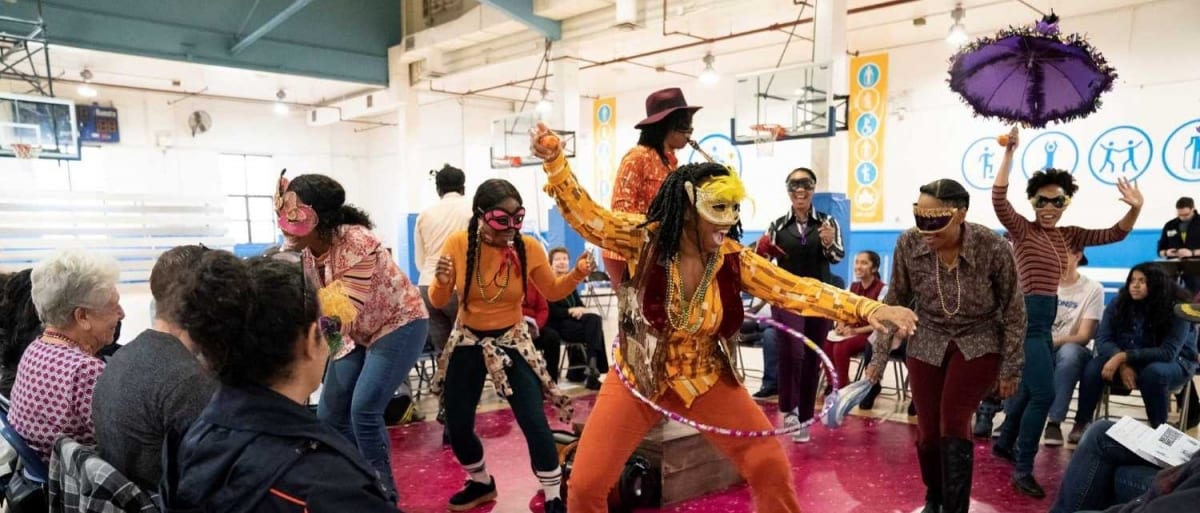If the Public Theater’s Mobile Unit is nothing else, it’s a party. Of course, the Mobile Unit is actually much, much more than this. But even with the challenge of putting on one of Shakespeare’s problem plays, which are infamous for leaving audiences scratching their heads and examining morality for 400 years, you can’t help but leave Measure for Measure without feeling like you’re leaving a community gathering.
Part of this is because of the mission of the Mobile Unit, which aims to go further in pursuit of “public theater” than the free “Shakespeare in the Park” shows – often inaccessible to anyone in an outer borough and/or without a day to spend camping out in Central Park for tickets. The Public Theater’s Mobile Unit tours neighborhood venues in every borough, from libraries to homeless shelters, from Staten Island to the Bronx. When they return home to the Public Theater, they bring with them an indomitable spirit of community which is too often suffocated out of Shakespeare. So when you arrive at the theater for Measure for Measure, seated around the minimalist performance space and surrounded by the actors warming up with an unbelievable and unapologetic energy, you already feel as though the show has begun. And you are part of it.
Director LA Williams sets his production of Measure for Measure in New Orleans, and the Mardi Gras vibes are very present. The show opens with a fantastically fun jazz number, complete with props, masks, and a saxophone player. A Louisiana fleur-de-lis on the desk of Angelo, the acting ruler of Vienna (I mean New Orleans), never lets you forget that we are in Louisiana. And the characters are dressed almost as though they have been pulled from parade floats – brightly-colored, over the top, and fabulous all around. (I, in particular, was consistently mesmerized by Mistress Overdone’s dress and Escalus’s silly, yet somehow magisterial hat.)
But what makes this Measure for Measure so enjoyable is not the costuming or the impressive use of an unimpressive space. The cast could pull off these characters with nothing but the vivacity with which they imbue them. Grace Porter as the “fantastical Duke of dark corners” draws a beautifully nuanced line between altruistic and manipulative, leaving you confused – rightfully so – about whether or not he is trustworthy. And even minor characters, forgettable with a less talented cast, are the stars of the stage for the time they inhabit it. Add to that the incredible chemistry of this cast, and even the most inconsequential of scenes becomes electric.
And the most consequential scene…? This production, wonderfully, doesn’t take itself too seriously – until it absolutely does. When the powerful, cold Lord Angelo (Adrian Kiser) threatens the novitiate Isabella (Jasmine Batchelor) with the death of her brother if she won’t sleep with him, Isabella realizes there is nothing she can do to expose this corrupt man, since his word will always have more worth than hers. She is trapped in her worst nightmare. It’s a scene that I always anticipate with distinct discomfort, because it never feels any less like a cruel, contemporary reality. The exchange between Kiser and Batchelor, under Williams’ direction, is downright chilling. Kiser masters an authoritative masculinity that defines her Angelo and gives the man a predatory air, even at his most vulnerable. And when Angelo threatens Isabella, the righteous determination on Batchelor’s face which quickly melts into utter helplessness is enough to make you cry.
Would you rule with mercy, or with justice? This is the question we, the audience, are asked to answer when we enter the theater. A string of Mardi Gras beads around our necks – gold for mercy, purple for justice – declares our answer for everyone to see as we watch the events of the play unfold. Will you like your answer once the show is over? Underneath all the exuberance and celebration of this production lies its true power – to make you think. And of course, in the true spirit of a community gathering, you’ll get a chance to discuss your thoughts after the show. And so the Mobile Unit achieves its mission once more – to bring the theater to the public, the way Shakespeare would have wanted.

